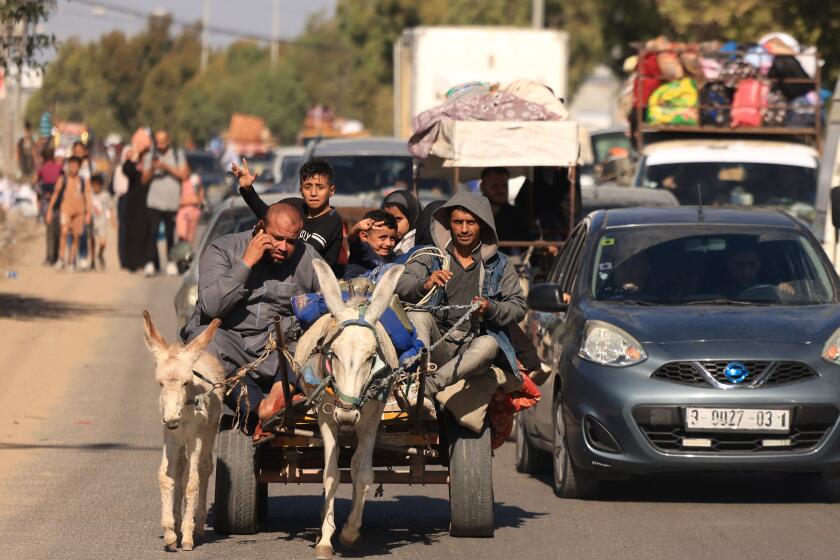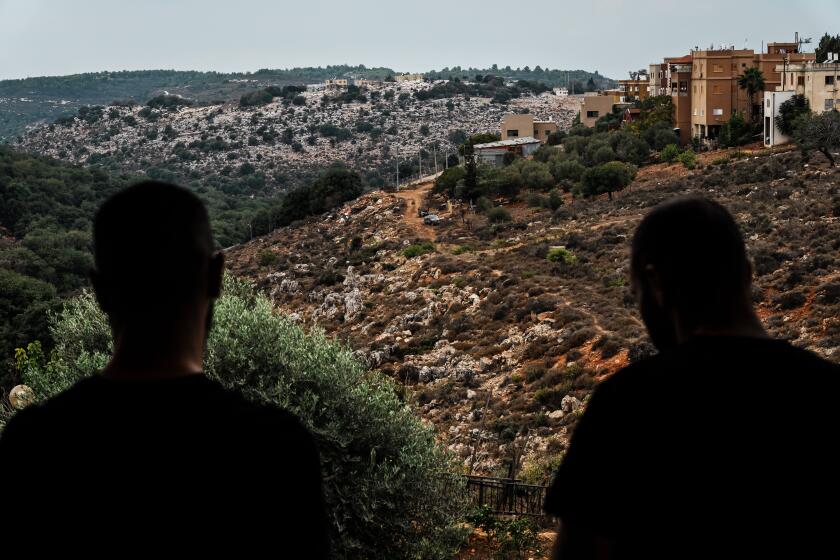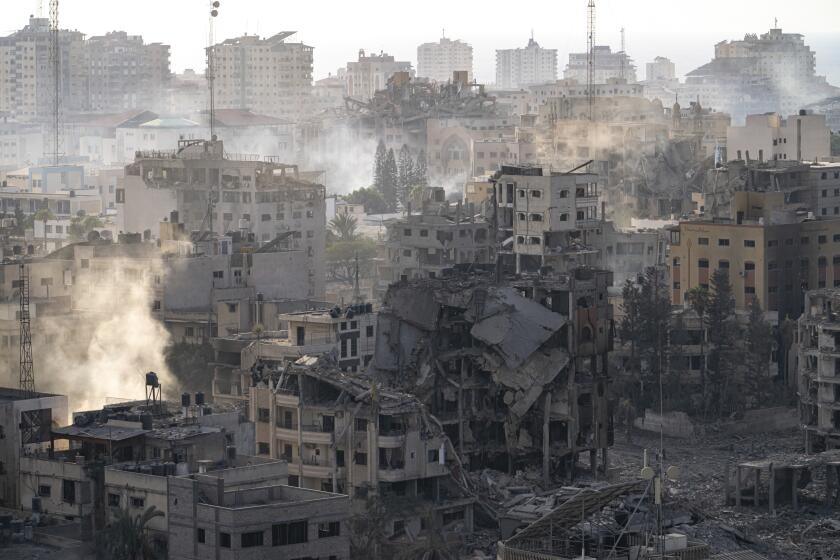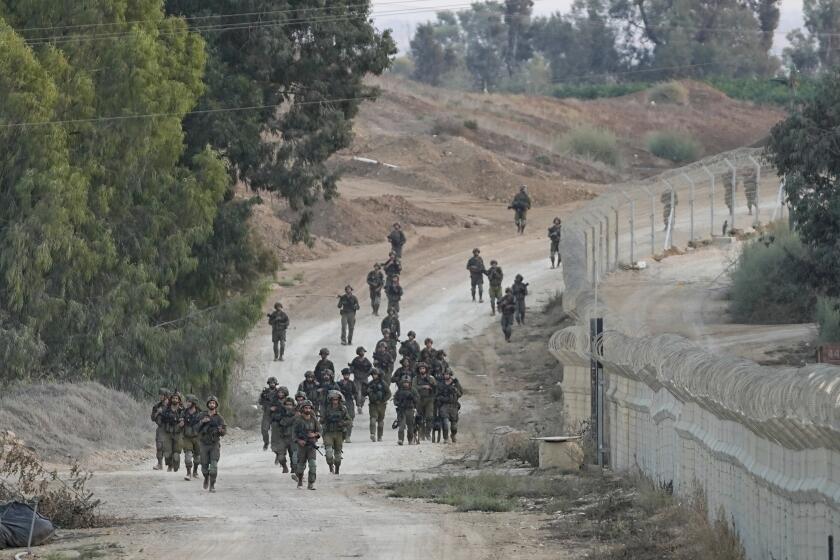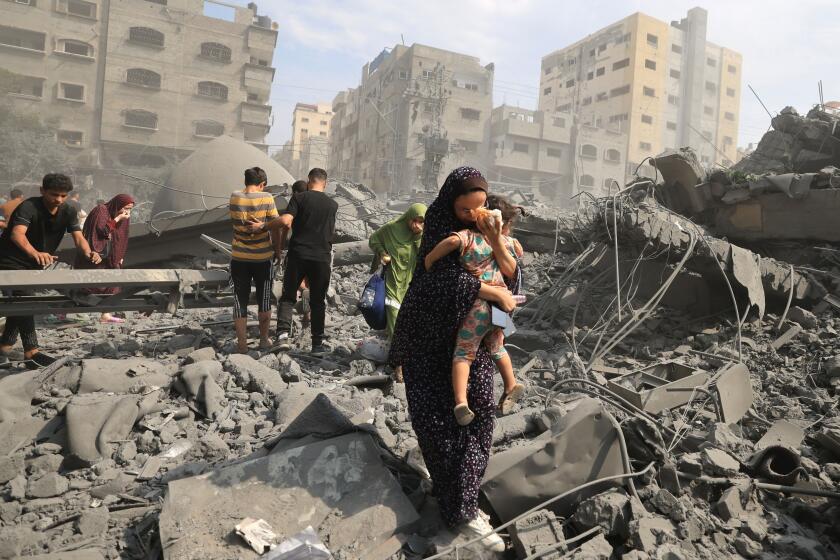Opinion: Invading Gaza, but to what end? Netanyahu’s incompetent government has no answers

- Share via
MODI'IN, Israel — In the days since Hamas terrorists launched an attack in southern Israel of shocking brutality and lethality, Israelis have been asking their leaders some increasingly urgent questions.
How could they have let this happen? How could entire towns and thousands of people have been left to fend for themselves for hours and hours while Hamas terrorists carried out a large-scale, multipronged assault virtually unimpeded?
Israel continues strikes after warning over a million northern Gazans to head to the southern strip — a displacement the U.N. says would be calamitous. Many stay behind.
Now, with over 360,000 Israeli military reservists mobilized and a possible ground war in the offing, what’s next? Among all those Israeli reservists and soldiers are friends of mine, children of friends, a brother. Are they going to be sent into Gaza to fight? To what end?
We’re not getting answers. Prime Minister Benjamin Netanyahu famously avoids taking questions, especially from Israeli journalists, and most senior members of his Cabinet have been studiously avoiding the public all week.
So let me ask these questions here.
What are Israel’s objectives in this war?
On Israel’s border with Lebanon, residents are worried that groups like Hezbollah will join a war that eventually spirals into a regionwide conflict.
None of the past Israel-Hamas wars succeeded in dealing Hamas a mortal blow. On the contrary, Hamas was able to reconstitute and rearm itself every time, even if it took several years. This was the case after the summer of 2014, when Israel last sent ground troops into the Gaza Strip.
It’s easy for Israeli officials to vow that Hamas will be destroyed, as Netanyahu has, but is that goal achievable? If so, why wasn’t it achieved before?
Surely Hamas has been preparing for an Israeli ground incursion. Its fighters succeeded in surprising the Israeli army in its own territory on Saturday; they must have more terrible surprises in store for Israeli forces on their home turf in Gaza.
That’s not to say the likelihood of Israeli casualties should stop Israel from invading Gaza. If an Israeli incursion will achieve security for Israel, the Israeli government must consider it. And the international community should wholeheartedly support the destruction of Hamas, which oppresses and kills Palestinians in addition to killing Israelis.
By rewarding Israel’s far-right extremists and castigating the moderates, Prime Minister Benjamin Netanyahu believed that he had finally found the solution to the Middle East conflict.
But will the hurried deployment of the blunt instruments of war actually achieve long-term security for Israel? Will reducing Gaza to rubble — as the Israeli military may be preparing to do with its order Friday that 1.1 million Palestinians evacuate northern Gaza — solve the problem? Are there no other, more effective ways to neutralize Hamas that Israel hasn’t yet tried? Is there no more effective approach that combines military solutions with political ones?
I don’t have the answers. But what seems certain to me is that a hastily assembled Israeli invasion of Gaza or the flattening of the strip with massive bombardment will seal the hostages’ terrible fate and leave thousands more Israelis and Palestinians dead, especially given Hamas’ propensity to use Palestinians as human shields.
And what of the hostages? The dead cannot be brought back, but the hostages’ fate has not yet been sealed. Will Israel’s leaders seek to bring them home?
The terrorist ambush launched from Gaza reflected an operational failure on the part of the Jewish state: a basic misunderstanding of the nature of the enemy.
This is not a rhetorical question. Israel’s finance minister, Bezalel Smotrich, leader of the right-wing Religious Zionist Party, said Saturday night that the Israeli army should “hit Hamas brutally and not take the matter of the captives into significant consideration.” This is the same man who in March called for Israel to “wipe out” the West Bank Palestinian town of Huwara following a Palestinian terrorist attack in which two Israelis were killed.
Is the callousness of this extremist the hand that guides Israeli policy? Is Israel more interested in killing enemies than in rescuing its own children?
For days after their loved ones were abducted and taken to Gaza, many relatives of the hostages hadn’t even been contacted by a government representative. No police, no government social worker, no army bureaucrat. How could Israel’s leaders be so unsympathetic as to fail to reach out to these people, day after day? It shows contempt for ordinary people and a glaring lack of responsibility.
There’s something deeply troubling about the discussion over Israel’s failure to prevent the attacks. It assumes the terrorists have no agency in choosing not to engage in barbarity.
Perhaps in other circumstances I would have more confidence in Israeli leaders’ decisions. But under Israel’s current leadership and given the events not just of the last week, but of the last few months, I and millions of Israelis don’t have faith in this government’s competence, integrity or fidelity to national interests over personal ones.
When I lie awake in bed at 2 a.m., unable to sleep because my windows are rattling with the booming from Israel’s bombs in Gaza 45 miles away, I do not feel reassured. I wonder if what I’m hearing is the attempt of a corrupt, inept government trying to overcompensate for its failures to protect its own citizens.
I can’t help but ask this last question of Netanyahu, the man under whose watch Israel experienced the deadliest day in its history; who appointed as national security minister a right-wing zealot, Itamar Ben-Gvir, so extreme that the Israeli army turned him away from mandatory military service; whose government failed to stem a surge of Palestinian terrorist attacks from the West Bank and then looked the other way when West Bank settlers rampaged through Palestinian towns to avenge those attacks; who pushed through the passage of judicial reform legislation that has torn the country apart; who for years has stoked division, hatred and fear among the people of Israel.
Isn’t it enough already?
Uriel Heilman is a journalist living in Israel. He writes for the Jewish Telegraphic Agency.
More to Read
A cure for the common opinion
Get thought-provoking perspectives with our weekly newsletter.
You may occasionally receive promotional content from the Los Angeles Times.
